In this article:
Native to North America, Africa, Asia, and Europe, (1) stinging nettle is, at first look, a basic plant. It has a tall green stem and pointy, serrated leaves. However, in the leaves are tiny hairs that are actually hollow barbs containing formic acid, an irritant chemical also found in bee stingers.
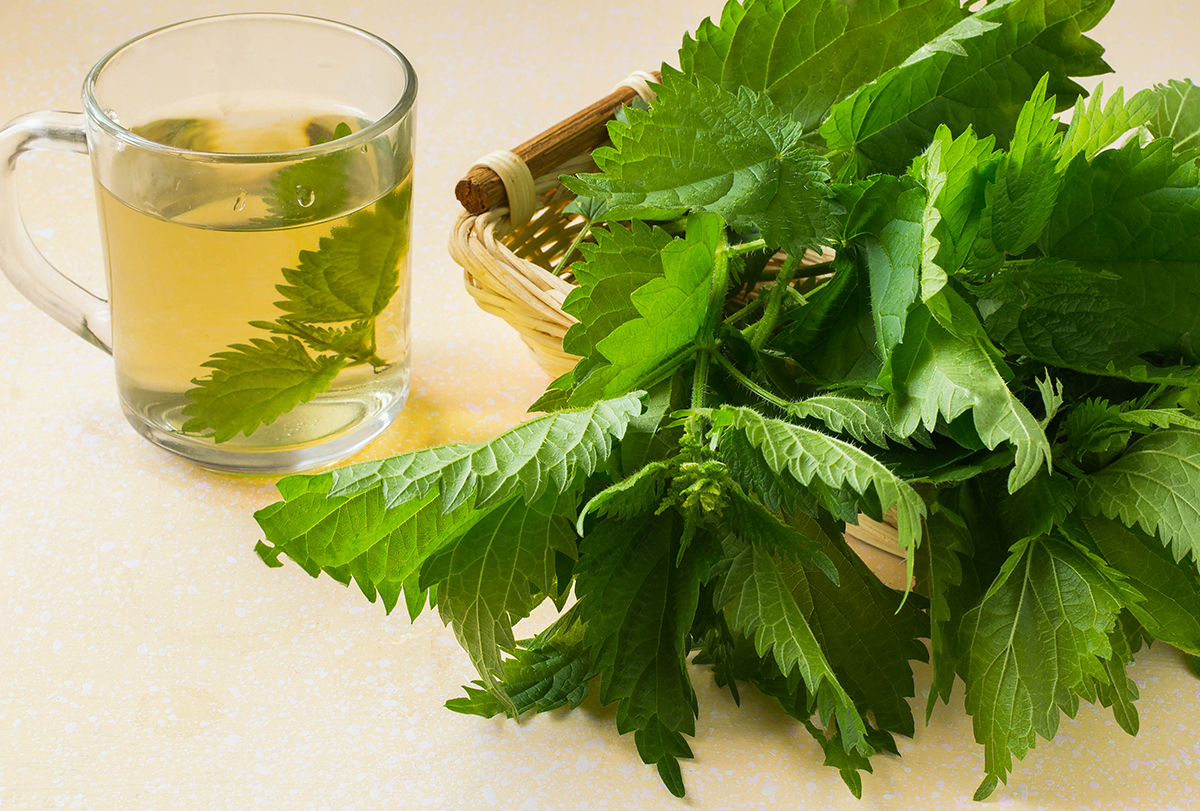
When these hairs touch the skin, they can easily break off into the flesh and cause a painful, unsightly rash that can last for hours.
But when properly processed, this plant is a nutritional gold mine with protein, fats, vitamins, and antioxidants that can benefit your body in a variety of ways! (2)
Nutritional Value of Stinging Nettle
As shown on USDA’s FoodData Central, a 3-ounce serving of processed or cooked nettle contains:
- A little over 2 grams of protein
- Less than ½ gram of fat
- Approximately 7 grams of carbohydrates (3)
The antioxidant value of stinging nettle is also high. The leaves contain good amounts of vitamins C, A, B complex, and K as well as active compounds such as lutein and lycopene, which are protective antioxidants. (4) The leaves are also high in minerals, including calcium and magnesium.
Potential Medicinal Uses of Stinging Nettle
Stinging nettle is a nutrition powerhouse and it is no surprise that this plant has been under study for its positive effects on health.
1. Relieves benign prostatic hyperplasia
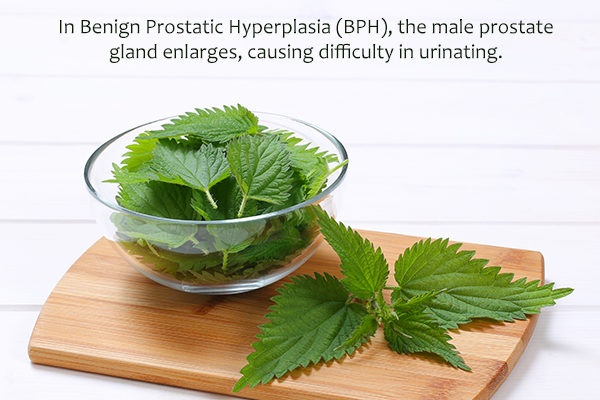
Some studies have looked specifically into nettle’s use as a potential alternative treatment for benign prostatic hyperplasia (BPH). In BPH, the male prostate gland enlarges, causing difficulty in urinating.
This condition is a non-cancerous normal part of the male aging process, although difficulty evacuating the bladder can be problematic. (5)(6)(7) Moreover, it is always important to see your physician to rule out much more serious diagnoses prior to self-treatment.
2. Aids in blood sugar control
Several studies have demonstrated the anti-diabetic effects of consuming stinging nettle in measured doses, but further research is needed to establish the long-term safety and efficacy of this intervention. (8)(9)
However, under no circumstances should you use stinging nettle in place of your prescribed diabetes medication unless advised by your doctor. Moreover, you must always check with your doctor before starting any medicinal herb to rule out any adverse reaction.
Note: A balanced diet and a physically active lifestyle enable you to control your blood sugar without the use of medicines. These measures also promote overall health and increase the quality of life.
3. Lowers blood pressure
An animal study investigated the antihypertensive and antioxidative effects of stinging nettle on rats with high blood pressure, in comparison with the effects of losartan, which is a commonly prescribed antihypertensive medication.
Results showed that all three nettle doses (10, 50, and 200 mg/kg/day) resulted in lower blood pressure and reduced inflammation. (10)
4. Fights inflammation
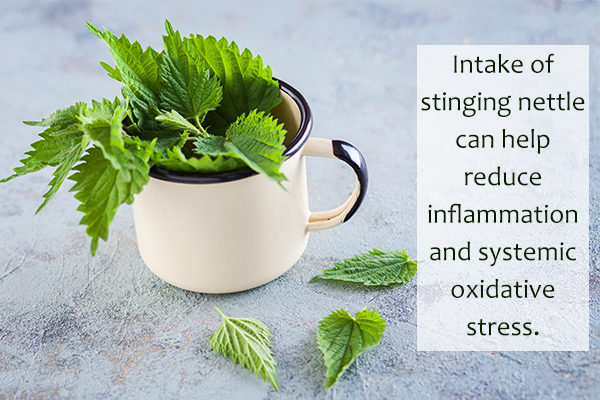
Stinging nettle has an abundance of active antioxidants (free radical scavengers), including vitamin C, lycopene, quercetin, and lutein, as well as other polyphenolic and flavonoid compounds or micronutrients that mostly come from plants. (2)(11) These compounds are known to fight inflammation in the body. (10)(12)
Moreover, there is evidence to suggest that regular use of stinging nettle as part of a balanced diet can lessen the discomfort associated with arthritis.
Note: Always talk to your doctor first before adding bioactive herbs to your regular nutrition regimen, especially if you are taking other medications.
5. Promotes kidney health
Stinging nettle contains significant amounts of antioxidants and caffeic acid compounds, which can induce diuresis or increased urination. (1)(11) The higher urine output can flush the metabolic waste from your system and reduce the toxic load on your kidneys.
Caution: Proper hydration is key, and that too much use of any substance with diuretic properties can cause dehydration, leading to adverse effects on the kidneys.
Moreover, kidney disease is extremely serious and beyond the purview of home treatment. Thus, consult a medical expert as soon as you notice any sign of renal malfunction to avoid life-threatening complications later.
ALSO READ: 10 Foods That Are Good for the Kidneys
6. Facilitates wound healing
Stinging nettle extract or residue may promote faster skin healing due to the presence of vitamin C and iron in it.
Nettle also contains notable amounts of phylloquinone (vitamin K), which is an important compound that the body uses to make clotting factors to stop or slow bleeding.
Although this is a very promising and interesting result, the studies are mostly animal-based. More research is needed in humans to fully elucidate the effects of nettle on minor burns and superficial injuries. (13)
Note: Please always seek out appropriate medical care if injured, and consult a doctor before using alternative remedies for potentially serious conditions such as deep cuts and second and third-degree burns.
7. Supports bone health
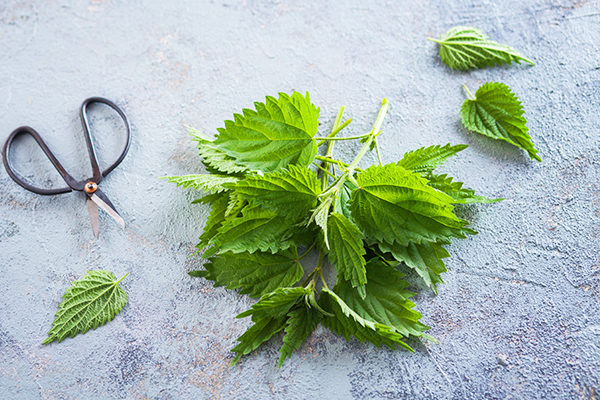
Another small-scale animal study looked at the effectiveness of using stinging nettle in promoting bone formation. Results showed that the rats treated with nettle had significant bone formation. (14)
For researchers, this result is very motivating, and more human studies in the areas of osteoporosis may be warranted.
8. Reduces allergies
One study looked into the effectiveness of stinging nettle in controlling allergy reactions. Results showed positive results as allergy symptoms were lessened, and levels of blood biomarkers went down. (15)
It is interesting that nettle would have such effect as other studies have shown that stinging nettle can initiate an allergic reaction simply by coming into contact with the tiny needle protrusions on its leaves. (2)
Uses of Stinging Nettle
Stinging nettle can be used in the following ways:
- Nettle leaves are dried and used in teas, cooked with other vegetables, or processed into flour to make other products.
- The leaves and stems are also sources of nettle oil extracts, which are used in toiletry products.
Raw nettle leaves must be cooked, dried, or processed to render it safe for consumption.
Caution: The little acid-filled hairs on raw nettle leaves sting your skin to cause a rash or induce an allergic reaction if eaten raw. However, if dipped briefly in boiling water (blanching) or dried out by a heat source, then this plant should not cause any rash or pain when touched or eaten.
Commercial and Non-Nutritional Uses of Stinging Nettle
Aside from being a food and supplement source, stinging nettle has also found several uses in other industries.
1. Textiles and plastics
Fibers from the stem and other less nutritional parts of the plant are processed to be a more durable version of cotton and are also chemically treated to make fabric dyes.
Nettle and other natural fibers are also added to products such as plastic and composite materials to increase the polymer’s performance and biodegradability factor. (16)
2. Horticultural/garden use
Stinging nettle is also a horticultural plant as it can increase the quality of the soil it is planted in by drawing out toxins and heavy metals. (1)
Caution: Nettle used for this purpose is not recommended for consumption in any way by animals or humans.
Preparation of Stinging Nettle
To enjoy this surprising nutritional jewel, you must clean them, especially all the little needles full of formic acid that “sting.” This can be done in a few ways.
1. Blanching
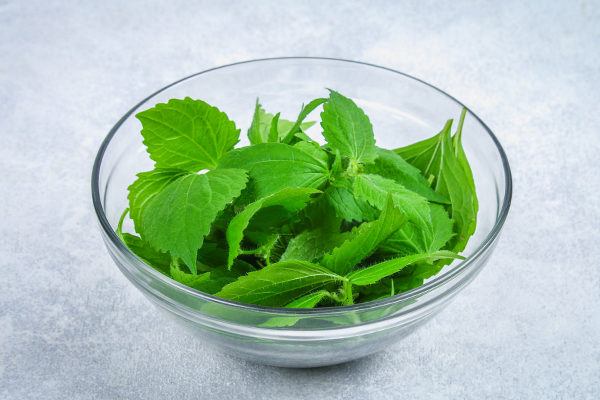
In this method, the outer coating of the plant is softened enough to be removed.
To blanch stinging nettle:
- Boil a pot of water.
- While the water is boiling, carefully dip the leaves and let them soak or cook for 30 seconds to 1 minute.
- Remove them quickly and lay them on a cloth or paper towel, so they do not become soggy.
Blanching is definitely the faster way to process nettles as you get them clean, you remove the needles, and you pre-soften them all at once.
2. Drying
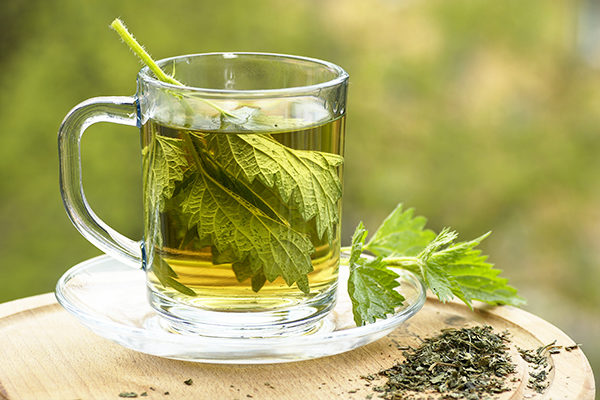
Drying is primarily used if you plan on making nettle tea, a perfect way to incorporate this plant into your diet if you do not want to cook them in food. This method requires washing the plant, which you should do thoroughly and while wearing gloves.
You can scrub nettles submerged in a bowl of cold water and then rinse them off either in the second bowl of water or under the faucet. Let them dry either naturally or by using a dehydrator or oven.
Side Effects and Drug Interactions
Stinging nettle interacts with the following medications:
- Losartan, if taken with stinging nettle, may cause dangerously low levels of blood pressure.
- Metformin, if taken with stinging nettle, may significantly lower blood sugar levels.
- If you have cardiovascular disease and have been placed on blood-thinning medication such as Coumadin, the liberal use of stinging nettle could counteract the effects of the drug due to the plant’s high vitamin K content, which assists with natural blood clotting.
The side effects of nettle include symptoms such as an upset stomach, sweating, and a feeling of being unwell and an allergic reaction. Due to stinging nettle’s effects on blood sugar and blood pressure, expecting mothers should refrain from adding this herb to their daily regimen.
Final Word
The stinging nettle plant is a very versatile, complex botanical that has many health benefits. Unlike other medicinal herbs and vegetables, stinging nettle requires proper handling for usage.
It is necessary to dry or blanch it before using it as a food ingredient. It is possible to be allergic to nettle leaves as with any other highly potent food product containing a lot of compounds. Hence, consult your primary care physician before incorporating this plant into your diet or wellness regimen.
- Was this article helpful?
- YES, THANKS!NOT REALLY


